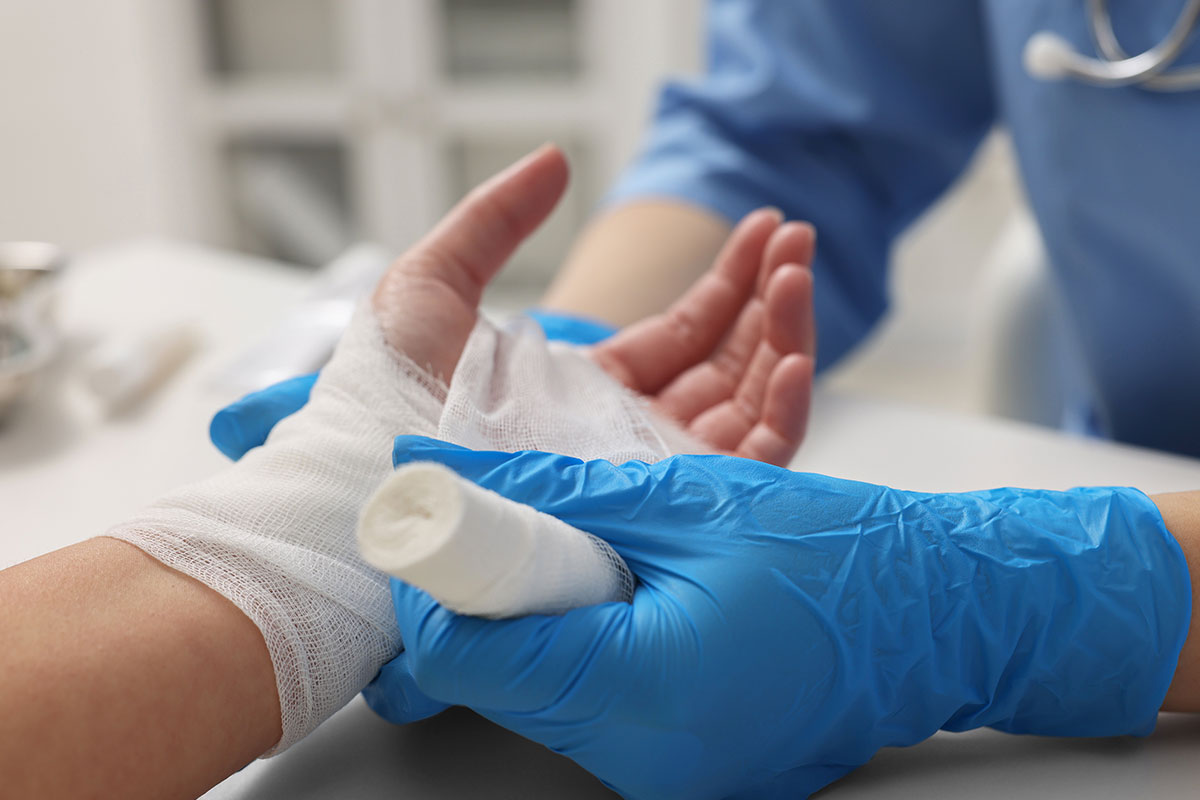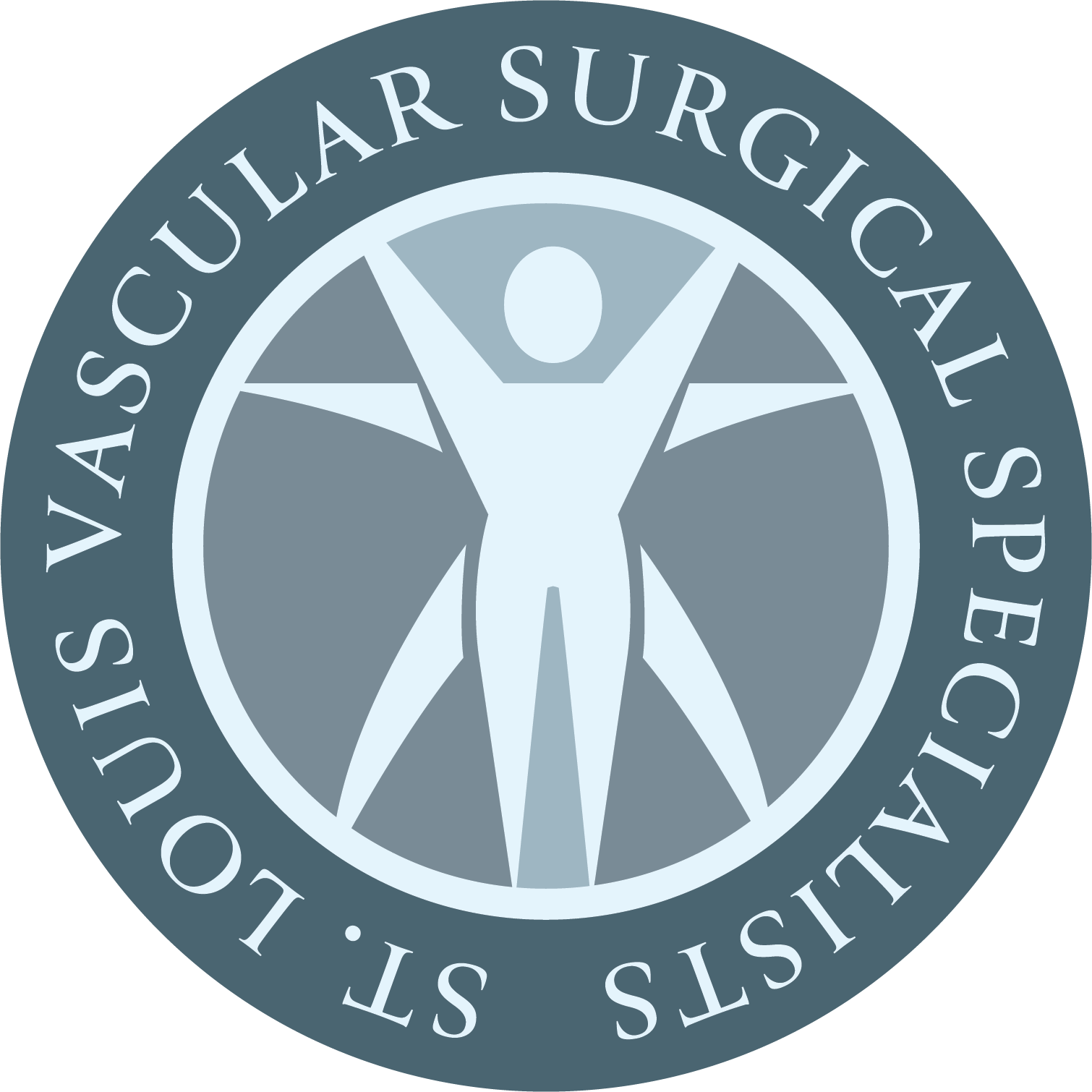Non-healing wounds require specialized care to promote optimal healing and prevent complications. At St. Louis Vascular Surgical Specialists, under the leadership of esteemed board-certified surgeon Dr. Hacker, we offer cutting-edge treatments and wound healing in St. Louis, tailored to each patient’s unique needs. Our approach integrates advanced techniques like debridement and wound dressings and innovative therapies like hyperbaric oxygen treatment to restore health and quality of life for individuals with non-healing wounds.
Treatments for acute wounds
Acute wounds are injuries that typically occur suddenly, often as a result of trauma or surgical procedures. These wounds undergo a well-defined healing process, progressing through distinct phases of hemostasis, inflammation, proliferation, and remodeling. Prompt treatment is crucial to facilitate efficient healing and reduce the risk of complications.
St. Louis Vascular Surgical Specialists uses a multidisciplinary approach to manage acute wounds. Our treatments for acute wounds include meticulous wound cleansing, debridement to remove devitalized tissue, and applying advanced dressings to promote a moist wound environment conducive to healing. Additionally, our team may use adjunctive therapies such as negative pressure wound therapy or advanced wound care products to optimize outcomes.

You may need treatment for acute wounds if:
- You have sustained a traumatic injury, such as cuts, abrasions, or puncture wounds.
- Your wound is deep or extensive, involving multiple layers of tissue.
- The wound is bleeding profusely and requires medical attention to control bleeding.
- You have undergone surgical procedures and require post-operative wound care.
- The wound shows signs of infection, such as redness, swelling, warmth, or pus discharge.
- You experience persistent pain or discomfort at the wound site.
- The wound fails to show signs of healing within the expected timeframe.
- You have underlying health conditions, such as diabetes or peripheral vascular disease.
- You are at risk of developing complications, such as wound dehiscence or tissue necrosis.
Contact us to learn about your options for wound healing in St. Louis.
Treatments for burn injuries
Burn injuries result from exposure to thermal, chemical, electrical, or radiation sources, damaging the skin and underlying tissues. These injuries vary in severity and are classified into degrees based on the depth of tissue involvement. First-degree burns affect the outer layer of the skin (epidermis), causing redness and pain, but they typically heal without significant scarring. Second-degree burns extend deeper into the dermis, and third-degree burns are the most severe, extending through all layers of the skin and underlying tissues.
At St. Louis Vascular Surgical Specialists, our approach may involve immediate first aid measures, such as cooling the burn with water, followed by thorough wound assessment and management. Depending on the severity of the burn, interventions may include wound debridement, specialized dressings, skin grafting, and reconstructive surgery. Additionally, our team coordinates closely with other specialists to provide comprehensive care and support throughout the healing process to minimize pain and reduce scarring with state of the art wound healing in St. Louis.
You may need treatment for burn injuries if:
- You have sustained a burn injury from heat sources such as flames, hot liquids, or steam.
- The burn affects a significant area of your body or involves the face, hands, feet, or genitals.
- The burn appears deep, with blistering, charring, or white or blackened areas.
- You experience severe pain, swelling, or redness at the burn site.
- The burn is accompanied by symptoms of shock, including rapid heartbeat or fainting.
- You have difficulty moving or using the affected area due to pain or restricted mobility.
- The burn is caused by chemical exposure, such as acids, alkalis, or strong detergents.
- You are at risk of complications, such as infection, impaired circulation, or scarring.
- The burn involves electrical injury, such as from electrical currents or lightning strikes.

Limb preservation
Limb preservation is essential in cases where patients face the threat of limb loss due to conditions like peripheral arterial disease (PAD), diabetic foot ulcers, or severe trauma. The primary goal of limb preservation is to maintain functional integrity and quality of life by preventing amputation and promoting optimal healing and function of the affected limb. At St. Louis Vascular Surgical Specialists, we recognize the importance of early intervention and comprehensive management strategies to preserve limbs and restore mobility.
Limb preservation strategies combine vascular diagnostics, surgical interventions, wound care, and rehabilitation services. We may recommend vascular procedures to restore blood flow to the affected limb, such as angioplasty, stenting, or bypass surgery. Additionally, our team uses innovative wound care techniques, including debridement, advanced dressings, and offloading strategies, to promote wound healing in St. Louis and prevent infection in patients with chronic wounds or ulcers. Through personalized care plans, we dramatically reduce the risk of amputations.

You may need limb preservation strategies if:
- You have been diagnosed with PAD, leading to reduced blood flow to your limbs.
- You experience leg pain, cramping, or numbness due to poor circulation.
- You have developed chronic wounds, ulcers, or gangrene on your feet or lower limbs.
- You have undergone traumatic injury to your limbs, resulting in vascular compromise.
- You are at risk of infections or tissue necrosis due to impaired wound healing.
- You have signs of critical limb ischemia, such as non-healing wounds.
- You have a high risk of amputation, as determined by your surgeon.
- You have a high risk of vascular disease and limb compromise.
- You want to prevent or delay the need for amputation and improve your quality of life.
Common complex wound treatments offered at SVSS
During your consultation, Dr. Hacker will thoroughly assess your wound, considering factors such as its size, depth, location, and underlying health conditions. He may also conduct diagnostic tests to gather information about your condition. Based on this evaluation, Dr. Hacker will collaborate with you to develop a treatment plan tailored to your specific needs. This plan may include a combination of interventions such as wound debridement, advanced dressings, surgical procedures, and adjunctive therapies to optimize wound healing in St. Louis.
Advanced Dressings
Specialized dressings manage complex wounds by creating an optimal environment for healing. These dressings use materials like hydrocolloids, hydrogels, foams, or alginates to maintain moisture levels, promote autolytic debridement, and protect the wound from contaminants. Some advanced dressings also contain antimicrobial agents to prevent infection. By providing a barrier against pathogens, advanced dressings support the natural wound healing process.
Wound Debridement
Wound debridement involves removing dead, damaged, or infected tissue from the wound bed to promote healing. This can be achieved through sharp debridement using surgical instruments, enzymatic debridement using topical agents that break down necrotic tissue, or mechanical debridement with wet-to-dry dressings. By eliminating impediments to healing and stimulating the growth of healthy tissue, debridement creates a clean wound bed conducive to cellular proliferation and angiogenesis, facilitating wound healing.
Skin Grafting
Skin grafting involves covering large wounds or areas of skin loss with healthy skin harvested from another part of the body (autograft) or from a donor source (allograft). The transplanted skin serves as a temporary or permanent wound covering, providing protection, promoting wound closure, and restoring skin function. Skin grafts facilitate wound healing in St. Louis by supplying viable cells, blood vessels, and extracellular matrix components for tissue regeneration while minimizing the risk of infection.
Compression Therapy
Compression therapy involves applying pressure to the affected limb or wound site using bandages, stockings, or specialized wraps. This pressure helps improve circulation, reduce swelling, and prevent fluid buildup, particularly in conditions like venous ulcers or lymphedema. By enhancing venous return and lymphatic drainage, compression therapy reduces edema, promotes tissue perfusion, and facilitates the removal of metabolic waste, thereby accelerating wound healing and preventing complications.
Negative Pressure Wound Therapy (NPWT)
Negative Pressure Wound Therapy (NPWT) involves the application of controlled suction to the wound bed using a sealed dressing connected to a vacuum pump. This creates a negative pressure environment that promotes wound contraction, removes excess fluid and bacteria, and enhances granulation tissue formation. NPWT also improves local blood flow and oxygenation, accelerates angiogenesis, and reduces edema, leading to faster wound closure.
Hyperbaric Oxygen Therapy (HBOT)
Hyperbaric Oxygen Therapy (HBOT) involves administering pure oxygen at increased atmospheric pressure within a hyperbaric chamber. This elevated oxygen concentration enhances tissue oxygenation, promotes collagen synthesis, and stimulates angiogenesis, accelerating wound healing in St. Louis in conditions such as diabetic ulcers, radiation injuries, and compromised grafts or flaps. HBOT also exerts antimicrobial effects, reduces inflammation, and enhances fibroblast activity, contributing to tissue repair and regeneration.
Schedule your consultation with Dr. Hacker
St. Louis Vascular Surgical Specialists is your premier medical center for wound care and vascular treatments. Led by Dr. Robert Hacker, a double board-certified surgeon with specialized fellowship training in vascular surgery, our practice offers cutting-edge treatments to heal complex wounds and prevent amputations. We believe in giving each patient our complete and undivided attention, treating you not merely as a patient but as a member of our extended family. Schedule your consultation to initiate your wound care plan with Dr. Hacker.
